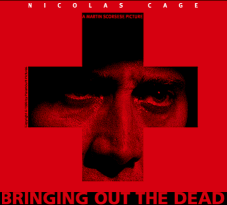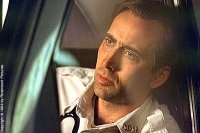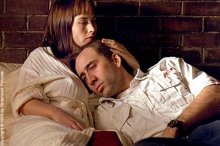 Starring
Nicolas Cage, Patricia Arquette, John Goodman, Ving Rhames, Tom Sizemore, Marc
Anthony, Cliff Curtis.
Starring
Nicolas Cage, Patricia Arquette, John Goodman, Ving Rhames, Tom Sizemore, Marc
Anthony, Cliff Curtis. Written by Paul Schrader from the novel by Joe Connelly.
Directed by Martin Scorsese
 Starring
Nicolas Cage, Patricia Arquette, John Goodman, Ving Rhames, Tom Sizemore, Marc
Anthony, Cliff Curtis.
Starring
Nicolas Cage, Patricia Arquette, John Goodman, Ving Rhames, Tom Sizemore, Marc
Anthony, Cliff Curtis.
Written by Paul Schrader from the novel by Joe Connelly.
Directed by Martin Scorsese
Grade: B-
Review by Alison Tweedie-Perry
Bringing Out the Dead should be a masterpiece. But it isn't. The latest picture from directing god Martin Scorsese displays all the maestro's trademarks--one man's journey through the dark underbelly of a certain segment of society, stunning visuals, excellent performances, morbid humor, perfectly suited popular-music soundtrack--but those elements don't hang together to make this the compelling film it should be.
Reteaming with screenwriter Paul Schrader (with whom the director collaborated
on The Last Temptation of Christ and two of his most highly regarded
classics, Taxi Driver and Raging Bull), Scorsese once again examines
the essential theme of the duo's earlier films--a man lost and ill-at-ease with
his place in the world seeking redemption. The man in this case is Frank Pierce
(Nicolas Cage), a paramedic who has been too long on the mean streets of New
York's Hell's Kitchen. Frank is burned out to the point that he is a walking
cinder. Ashy skinned and hollow eyed, he has discovered that his job is not
to save people so much as to be a chauffeur for vagrants and a witness for the
forgotten dead. 
We follow Frank as he makes his rounds over three nights on the weekend of a full moon. Battling insomnia, pernicious drug epidemics and dealers, and the haunting visions of those he couldn't save, Frank is searching for a reason to continue doing what he does or a way to stop doing it. He rides with three different partners, called to various hopeless or useless situations. He becomes involved with the daughter (Patricia Arquette) of a patient who may have a chance to pull through, which few of them have done recently. He relives tragedies and seeks solace in dubious locations, like a local drug dealer's "oasis." He repeatedly encounters Noel (Marc Anthony), a mentally deficient homeless man. He tries many times to get fired, but his jovial boss won't do it, and Frank can't bring himself to quit.
Many things are right with the film. The performances are almost uniformly
excellent. Nicolas Cage displays the mournful quality that won him an Oscar
in Leaving Las Vegas, occasionally breaking into the sheer lunacy displayed
in some of his more memorably loopy characters, like Sailor from Wild at
Heart. As Noel, Latin-music star Marc Anthony shows that he can do more
than salsa. John Goodman, as a phlegmatic stalwart, biding time planning his
next meal; Ving Rhames, as a super-smooth, evangelistic ladies' man; and Tom
Sizemore, as a bloodthirsty nutcase, all provide comic relief and welcome liveliness
as Frank's ambulance partners. Only Patricia Arquette hits the wrong notes.
As a former junkie feeling the lure to return because of her father's grave
condition, she's meant to be the calm shelter for Frank's storm facilitating
his redemption, but comes across, instead, as a wet blanket. 
Hell's Kitchen comes alive, restored to the glorious seediness of its days before the cleansing, homogenizing reign of Rudolf Giuliani and Disney. No one knows New York like Scorsese, and it's always a pleasure to travel with him through his city. The scenes in the ambulance and of the paramedics out on calls are delightful. They allow the director and the actors to show off (pay special attention to the paramedics' interactions with the faceless dispatchers), taking us inside the job and Frank's circumstances. Unfortunately, the facility of these scenes (and a few others, such as Frank's interactions with drug impresario Cy Coates, played by Cliff Curtis) clashes with the clunky narrative and only serves to highlight how good a film this could have been.
The primary problem with Bringing Out the Dead is its pacing. It careens between stultifying lags and adrenaline-juiced jags, never achieving a sense of dramatic tension. The story plays as a series of vignettes rather than a whole with a purpose. The thrill of the sequences when the ambulance is moving is never matched by the intensity of the quieter moments, with jarring consequences--periods of somnolence are interrupted by over-amped hyperactivity. While that contrast may be true to the life of a paramedic, it makes for uncomfortable film viewing.
Comparisons to Taxi Driver are inevitable and, perhaps, just. After all, Frank Pierce, like Travis Bickle, can't sleep and drives around the city all night in service to others. They both see something very wrong with the world and their places in it. Where Taxi Driver triumphs and Bringing Out the Dead fails, however, is that the former builds in intensity, slowly drawing you in and holding you rapt. Bringing Out the Dead fails to draw us as deeply into Frank Pierce's world as we went into Travis Bickle's. Why it fails or who is to blame for that failure, I'm not quite sure. The story seems primarily at fault, but shouldn't Schrader's screenplay or Scorsese's realization have remedied the story's flaws? At the very least, Scorsese's attendant editing goddess, Thelma Schoonmaker, could have fixed the pacing problems.
There is plenty to appreciate in Bringing Out the Dead, and it is by no means a disaster. It is simply that the inherent problems with the way this story flows combined with the burden of Scorsese's history weigh the film down. The last half is much more cohesive than the first, but by the time the story wraps us up, the movie is over. Like an ambulance stuck in midtown traffic, the help comes too late.
Review © October 1999 by AboutFilm.Com
and the author
Images © 1999 by Paramount Pictures. All Rights Reserved.
|
Send
us a comment on this review. |
 |